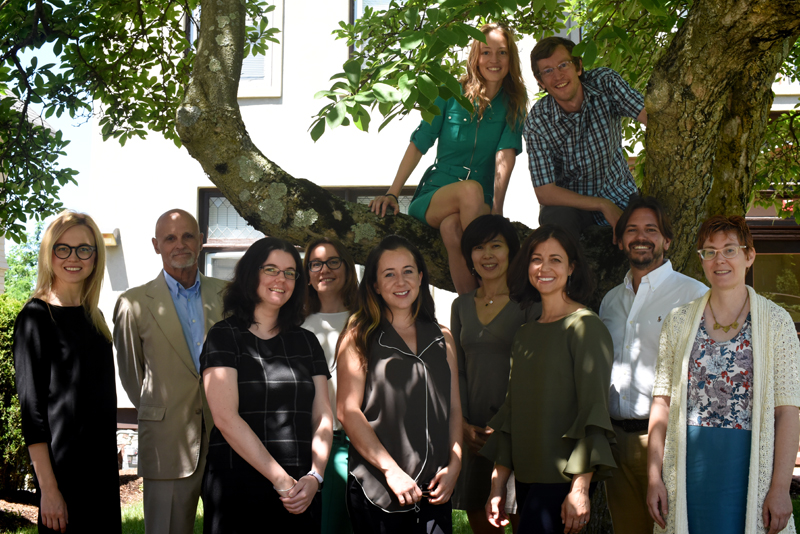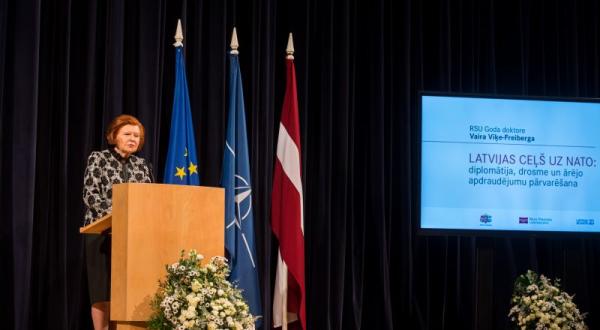Lawyer Santa Slokenberga is an RSU graduate who currently resides in Sweden
Santa Slokenberga is a lecturer in the Faculty of Law at Rīga Stradiņš University (RSU) and one of the first graduates of the RSU Faculty of Law, who later obtained her Master’s degree in Great Britain and a doctoral degree – in Sweden. She currently splits her time between two countries – Latvia and Sweden. Santa is a postdoctoral fellow at Lund University and a researcher at Uppsala University, whereas in Latvia she gives lectures to RSU students and consults in matters related to medical law.
Santa Slokenberga has been giving lectures at RSU since 2011. Currently she leads classes and gives lectures to undergraduate and Master’s students not only in the Faculty of Law, but also the Faculty of Medicine. Among the courses she holds are Medical Law, Law of Healthcare Organisations, Current Issues in Rights Protection of Patients and Healthcare Professionals etc.

After graduating from Rīga State Gymnasium No.1, she commenced her studies at RSU by chance. She had initially planned to spend a productive year studying Law at RSU and then pursue Economics. However, she became even more interested in Law, obtained a Bachelor’s degree in Law at RSU and later graduated from the Law Master’s study programme. Recalling the beginning of her studies at RSU, Santa Slokenberga says: 'With each class my interest in Law grew. The longer I studied, the more I wanted to know.'
In 2009, when Santa completed her Bachelor’s degree, Medical Law was a relatively new discipline in Latvia’s legal system. She decided to pursue her graduate studies at the University of Kent, England, obtaining a Master’s degree in Medical Law and Ethics, and a doctoral degree – at the University of Uppsala, Sweden. Santa Slokenberga has no doubts about the high quality of studies at RSU, claiming that 'RSU gave me a solid foundation from which I could go on to study medical law in England on the Master’s level.'
She is the scientific editor of a book titled Medicīnas tiesības (Medical Law) which is the only publication of its kind in Latvia. The book, written by several authors, was published by the company Tiesu namu aģentūra (translated: Courthouse agency) with students, academic staff, lawyers and persons engaged in healthcare as the target audience. Santa is currently working on her next project – comments on the Law of Patient Rights have been sent to Latvijas Vēstnesis (the official publisher of the Republic of Latvia) for publishing. This edition will be available to the public at the end of the year.
She has been working both in public administration in the healthcare sector and private companies by providing legal consultations in medical law. Santa is very motivated, enthusiastic and determined.
Why have you decided to specialise in Medical Law?
Medical Law is a second coincidence following my studies at RSU, as already in my 1st year I realised that just studying was not enough. I wanted to see the big picture, as all I had were small pieces of a puzzle – knowledge I obtained during my studies at the university. I wanted to understand the way each area of law functions and experience it in practice. For example, the way the administrative process has been applied in the relation between the state and individuals etc.
At the end of the first year I came across a wonderful opportunity to undertake a placement in a government institution – the National Health Service (then – Mandatory Healthcare Insurance State Agency). Initially I undertook a summer internship that lasted one or two months, following which the head of the Legal Department offered me part-time work in the field of medical law. The small tasks that I had the opportunity to undertake there were a great addition to my studies, and helped me to see the “big picture”. It all seemed so exciting and motivated me to work harder.

9 November 2016. Santa Slokenberga's dissertation defence. Together with Prof. Tamara Hervey. Photo: Dainis Caune
What was the toughest thing while studying at RSU?
Occasionally, the workload was heavy, however, in general, the studies were not difficult for me. Looking back now on the study workload at the Faculty of Law, you can say that success is the result of hard work.
The RSU Faculty of Law provides great freedom for students, which is possible due to the module system and a focused schedule. It means that one must diligently study for four weeks, as following that there is an exam week and, then, the next study courses. If you don't start studying at the beginning of the study course, it is because then there is already a test or an exam coming up.
RSU students must learn early how to plan their time responsibly, because the university provides only a small fraction of what is necessary, and the student must find their own way to get what they need in order to be a professional and build a career in this field.
Who were your lecturers in Law?
Relatively speaking, there are three groups of teachers. The first teachers are the RSU teaching staff who collectively gave me a sense of the law. The most complex topics could be discussed in an informal atmosphere in any class. It was not like the teachers were just standing in front of the audience and explaining one truth. Instead, they sat with us and started up a dialogue with us. It is another level of education! From the outset, I placed an equal sign between the teacher and knowledge and understood that I want to be like them and become a teacher too.
The second group consists of three lecturers. The dean of the RSU Faculty of Law, Professor Andrejs Vilks, has always been supportive. No matter what the idea was, he has always supported and encouraged me, giving me the confidence that the university is on the student’s side. It appears that this strong support is available to anyone who wants to work, develop and become a leader in their field. For example, just recently we helped a woman, a graduate from the Master’s programme in the Faculty of Law, to apply for a Fulbright scholarship – we provided recommendations and consultations. We hope that she will later return to RSU as a teacher. The support of Professor Andrejs Vilks played an important part in this process.
Lecturer Ginta Leimane entered the study process with great energy and a strong character. The knowledge she gave me and the approach to work are valuable to me.
The third person that I would like to mention is Assoc. Prof. Solvita Olsena, who no longer works at RSU. She has specialised in medical law was especially supportive as I was developing my interest in medical law.

"During the summers I teach at the Yale University Summer Institute," Santa Slokenberga shares (first from left). 2018. Source: http://law.lu.se
And finally, the third group of teachers are my fellow lawyers both from academia and those who are practicing law. I can learn from each one of them, and it is not always academic knowledge. Often, a colleague is a mirror who allows me to take a bird's eye view and evaluate how I work with students, what could be improved, and what areas I should expand my knowledge in. For example, in spring, one of my colleagues piqued my interest about the importance of the state continuity doctrine in Latvia; whereas this summer, a colleague inspired me to research legal methods.
What is an RSU student like?
An RSU student is a great student! It is pleasant to work with RSU students, because they are engaged. Yes, they are direct and sometimes even harsh, but they seek and want to understand. I can talk with Latvian students wholeheartedly about legal challenges, without fear of calling things by their proper name, and that is the greatest thing possible!
A student who is interested in their studies will always be a good student. And I am not talking about an honours student or excellency in all study courses, but about the approach to work and the desire to learn and understand.
In Sweden, the relationship between teachers and students is very distanced and formal. The teacher must stay neutral and reserved towards all students and in such an environment there is little room for a personal approach. At RSU, we still have the opportunity to maintain this personal approach, at the same time ensuring equality with the students. In this way, it is possible to support students who choose to do more than what is expected of them.
What should one keep in mind if you want to become a good lawyer?
One needs knowledge and a desire to learn. A lawyer must be knowledgeable with high moral standards and respect towards colleagues, the system and the country where they work. Understandably, we should separate respect towards the state system and democratic values from criticism of the law or the existing order. Furthermore, a lawyer should be prudent, able to distance themselves and have a bird's eye view of a scandal or a problem, instead of doing something rash, based on emotions. I have observed bad examples, where great lawyers have tarnished their reputation due to lack of emotional control. It is not easy to get clear that.

Santa Slokenberga presents at a conference. Photo from private archive.
What are the strengths of RSU compared to other universities in Latvia that offer law studies?
One of the strengths of RSU is the accessibility of its teachers. The teachers are very open and accessible, oriented towards communication with students. I also gained much from this – if I had a question or was uncertain about something, I could always write an e-mail to my lecturer knowing that I would get an answer soon. It was even possible to call some of the lecturers, because occasionally they trusted their students with their phone numbers. That was a very great support!
The RSU Faculty of Law is dynamic and ready for change and anything new in legal science, introducing it into the education process and making it available to the students. If there is an idea, RSU will always find a way to implement it, and that is valuable.
It is good that students are heard at RSU, and that the groups are small, because then it is possible to work individually and it is easier to notice those who are more interested or have greater potential. We help students in various ways - with their first publications, for example, or to prepare for a conference and so on.
Employers appreciate and know that an RSU graduate will have a good foundation in medical law and social rights in particular.
What should be changed or improved at RSU?
In Sweden we use the so-called problem-based learning approach that requires students to prepare independently, to solve problems at home and come to seminars with answers. Lectures are still the basis of the RSU Faculty of Law. Problem-based learning develops analytical skills and argumentation, as well as prepares students better for the labour market.
Even though RSU has excellent cooperation with students, we cannot rest on our laurels – the dialogue between teachers and students requires continual strengthening and improvement. The student should be respected in all situations. There should be equality between and equal rights for both for teachers and students.




